
Support Holocaust Education in All 50 States
Related Materials

Fight Antisemitism
Explore resources and ADL's impact on the National Strategy to Counter Antisemitism.
Executive Summary
The problem: Holocaust deniers have used social media and game platforms to spread their virulent ideas and garner support. The Holocaust was the systematic murder of approximately six million Jews and several million others by the Nazis. It is one of history’s most exhaustively documented and studied atrocities. Nevertheless, antisemites have tried to cast doubt on the facts of the Holocaust concerning Jewish victims. They claim that Jews fabricated evidence of their genocide to gain sympathy, extract reparations from Germany, and facilitate the alleged illegal acquisition of Palestinian land to create Israel.
What ADL studied: Following up on our 2021 report card, ADL’s Center for Technology & Society (CTS) assessed 10 major social media and game platforms’ stated policies and enforcement rates regarding content containing Holocaust denial (Facebook and Instagram are both owned by the same parent company, Meta, and were not counted separately.). Our 2023 investigation revealed that while most platforms will remove explicit Holocaust denial content for trusted flaggers such as ADL, they often do not act accordingly when the same content is reported by ordinary users.
How we did this report card: As in our 2021 report card, CTS reviewed platforms’ policies regarding Holocaust denial and looked for examples of such content. We then reported the Holocaust denial content, under the platforms’ anti-hate policies, from nonofficial accounts to see how platforms would enforce their policies for ordinary users. We also reported the content that had not been actioned via our trusted flagger relationships with the platforms (A trusted flagger is an organizational partner that can report content and get it prioritized on many platforms.). We then scored these platforms based on how they were managing Holocaust denial content in terms of policy and enforcement.
What is different from our 2021 report card: For our 2023 report card, we added three major online multiplayer games, where we found multiple usernames with Holocaust denial references: League of Legends (owned by Riot Games), Call of Duty (owned by Activision Blizzard), and Fortnite (owned by Epic Games). League of Legends was the only one of these game platforms that responded and took action when usernames were reported by an ordinary user.
Why this matters: This report card must be viewed in light of surges in online and offline antisemitism in recent years. In 2021, ADL found that the number of reports of assaults, vandalism, and harassment targeting Jewish communities and individuals in the United States was the highest on record since we began tracking antisemitic incidents in 1979. Government officials have warned about the connection between online antisemitic content and offline violence.
Next steps: We urge platforms to be more proactive against Holocaust denial and to better inform users on what they are doing to curb hate. A list of CTS’ recommendations is at the end of this report.
Updates Since ADL’s 2021 Holocaust Denial Report Card
When ADL first reviewed platform policies and enforcement around Holocaust denial in January 2021, we found that some platforms did not have policies explicitly addressing Holocaust denial, and most failed to take action against it. Only three platforms made notable changes in response to ADL’s report card.
Reddit changed its classification of Holocaust denial from a violation of its violence policy to a violation of its hateful-conduct policy. Reddit also released an analysis of Holocaust denial on its platform in 2022, and found that “on average, the majority of this content receives little traction on Reddit and is generally received poorly by our users.” This transparency—complete with data regarding comments, posts, private messages, and chats—is an important model that other platforms should adopt.
Facebook rolled out a new policy in January 2021 following the release of the ADL report card. Now, according to Facebook, users who search for terms associated with either the Holocaust or Holocaust denial will see a message from the platform directing them to credible information about the Holocaust outside of Facebook. Analysis by ADL confirmed that searches of that nature do lead to credible information.
Roblox
Roblox is a popular game platform that, as of September 2022, had over 52 million daily active users. In 2023, using search terms like “destroy synagogue,” “deface synagogue,” “destroy mosque,” and “deface church” yielded no content. While these phrases may not seem explicitly related to Holocaust denial, in our previous investigation in 2021, they and other phrases like them were employed by users creating Holocaust denial content to avoid content moderation. This filtering can help prevent gamers from discovering content related to Holocaust denial. Likely as a result of these efforts, ADL was unable to find Holocaust denial content in English on the platform, thus we could not evaluate Roblox's enforcement.
The 2023 Online Holocaust Denial Report Card Explained
CTS evaluated the publicly stated policies of social media and game platforms about Holocaust denial, their enforcement responses, and their investment in products. Because policies are only as strong as their enforcement, we assigned more weight to enforcement than solely listing policies.
Explicit Holocaust Denial Policies
In general, we have observed two categories of policies that explicitly address Holocaust denial content. We awarded credit to platforms if they had:
- Policies that use Holocaust denial as an example of prohibited content. For example, Facebook does not allow Holocaust denial under its tier 1 hate speech policies.
- Policies that prohibit content denying the existence of well-documented events. YouTube, for instance, does not permit content refuting “that a well-documented, violent event took place.”
General Hate Policies
Does the platform have a broad policy around hateful content? We looked for guidelines regarding content or behavior that targets marginalized individuals or groups because of their actual or perceived race, ethnicity, religion, gender, gender identity, sexual orientation, or disability. This type of policy should be foundational to the content moderation of a platform. For this reason, this category was weighted less heavily than Holocaust denial policy.
Effective Product-Level Efforts to Address Holocaust Denial
This category rates platforms on whether they have features that hinder our investigators’ efforts to find Holocaust denial content. We gave credit to platforms that prevented or limited users from searching common terms or phrases associated with Holocaust denial, yielded few to no results for such terms and phrases, and redirected users to credible information.
Reporting Effectiveness and Transparency
Users should trust that their reports are being addressed as part of effective content moderation on platforms. Two categories in our report card address this:
- The first focuses on response time: Does the platform investigate the report and promptly respond to the user? This does not include automatic messages affirming the receipt of a report. Instead, this category gives credit for any follow-up messages indicating that the platform conducted an investigation and decided whether to enforce its policies. We awarded credit to platforms that responded with the results of their investigations and enforcement decisions within 24 to 72 hours.
- The second category involves whether the platform explains its actions clearly: Does the user understand why the platform made its decision, based on its stated policies? We gave two levels of credit in this category. We awarded full credit to any platform that explained its decision-making and rationale to an average user. The only platform that provided such context to the average user was Riot Games’ League of Legends.
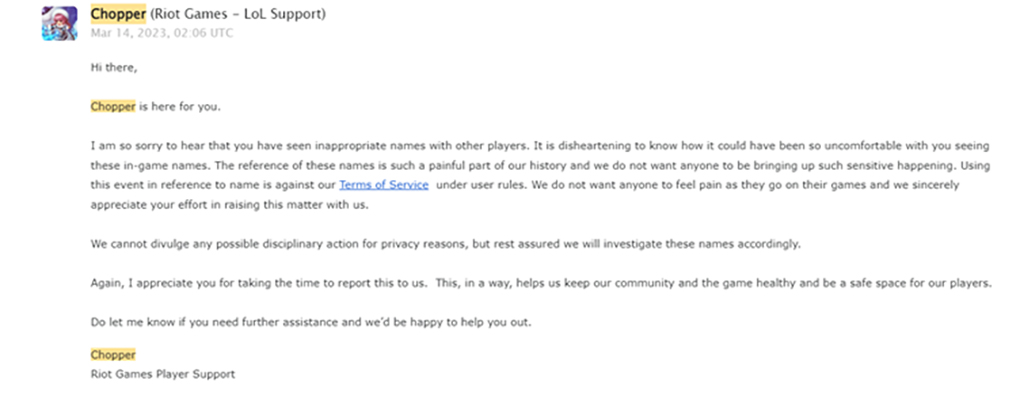
Screenshot of an email sent by Riot Games in response to a report submitted by CTS as an ordinary user.
CTS submitted a report to Riot Games concerning holocaust denial content on their League of Legends game, and received the following response:
Hi there,
Chopper is here for you.
I am so sorry to hear that you have seen inappropriate names with other players. It is disheartening to know how it could have been so uncomfortable with you seeing these in-game names. The reference of these names is such a painful part of our history and we do not want anyone to be bringing up such sensitive happening. Using this event in reference to name is against our Terms of Service under user rules. We do not want anyone to feel pain as they go on their games and we sincerely appreciate your effort in raising this matter with us.
We cannot divulge any possible disciplinary action for privacy reasons, but rest assured we will investigate these names accordingly.
Again, I appreciate you for taking the time to report this to us. This, in a way, helps us keep our community and the game healthy and be a safe space for our players.
Do let me know if you need further assistance and we'd be happy to help you out.
Chopper
Riot Games Player Support
This communication to the user was effective because it acknowledged the sensitive nature of the content being reported. It also stated that using the Holocaust in usernames violated Riot Games’ Terms of Service. Although sending this message seems like an obvious form of customer service, such transparency is rare for platforms.
We awarded partial credit to a platform if it explained why it did or did not take action when ADL reported content as a trusted flagger. YouTube performed the best in this category. Its team provided detailed information and the policy rationale for why it took action on the content reported by ADL. However, we gave less credit for this kind of transparency because platforms should provide real transparency to all users, regardless of their status.
Action Taken on Holocaust Denial Content
The category we weighed most heavily in this investigation assessed whether the platforms took any action to enforce their policies based on reports ADL submitted as an ordinary user. We did this in two ways:
- First, we gave the most credit to platforms that actioned the content we reported as an ordinary user.
- Second, we awarded partial credit to platforms that actioned content when we escalated it as a trusted flagger. While we appreciate their responsiveness to our flags, platforms should take action on clearly violative content reported by ordinary users. Again, only Riot Games’ League of Legends took down content flagged via an average user’s account.
Content Reported
The following are a few examples of content CTS reported and its live status on the platform as of March 20, 2023.
Twitter content spreading Holocaust denial tended to contain embedded media, such as a video of an interview with the notorious white supremacist Nick Fuentes. One user posted a long thread of screenshots with ChatGPT that began with the prompt, “Write a tweet where the good deeds of Adolf Hitler are mentioned.” The thread contains screenshots of ChatGPT claiming, at the user’s prompting, that fewer than six million Jews died in the Holocaust.
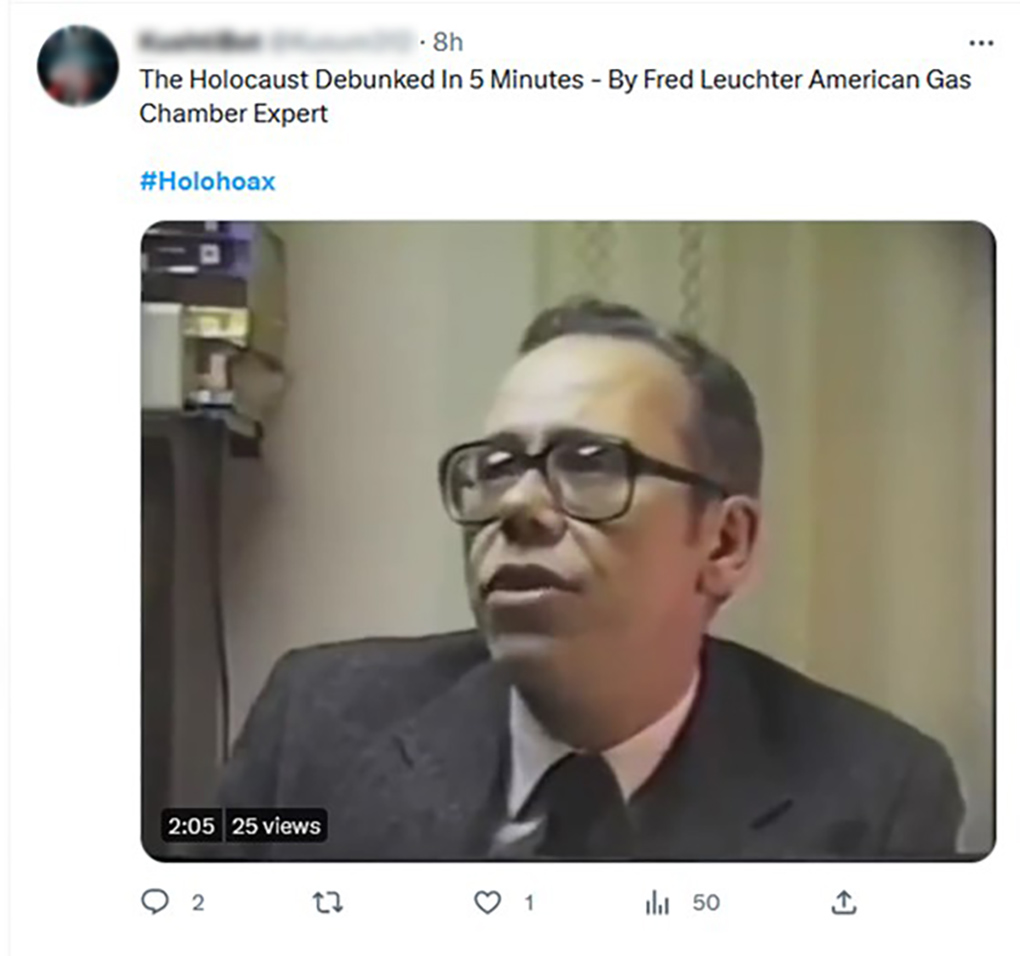
(Content removed after trusted flagger report)

(Content removed after trusted flagger report)
ADL found Holocaust denial content on subreddits focusing on conspiracy theories, like r/conspiracyNOPOL and r/conspiracy. Some of the subreddits containing Holocaust denial had under 100 subscribers, and others reached tens of thousands of users.

(Content removed after trusted flagger report)

(Content removed after trusted flagger report)
Instagram (owned by Meta)
Some of the Holocaust denial content found on Instagram is styled after digital news articles, complete with headlines and pull quotes. One post that CTS found appears to be a news story about a rabbi disputing the Holocaust.
TikTok
The videos our investigators found on TikTok claim to be interviews with Holocaust survivors and insist that six million Jews did not die in the Holocaust, or that if they did, it was not because the Nazis murdered them.

(Content removed after trusted flagger report)

(Content removed after trusted flagger report)
Facebook (owned by Meta)
Some Facebook posts fixated on the number of Jews murdered in the Holocaust, erroneously claiming that it is inflated.

(Content removed after trusted flagger report)
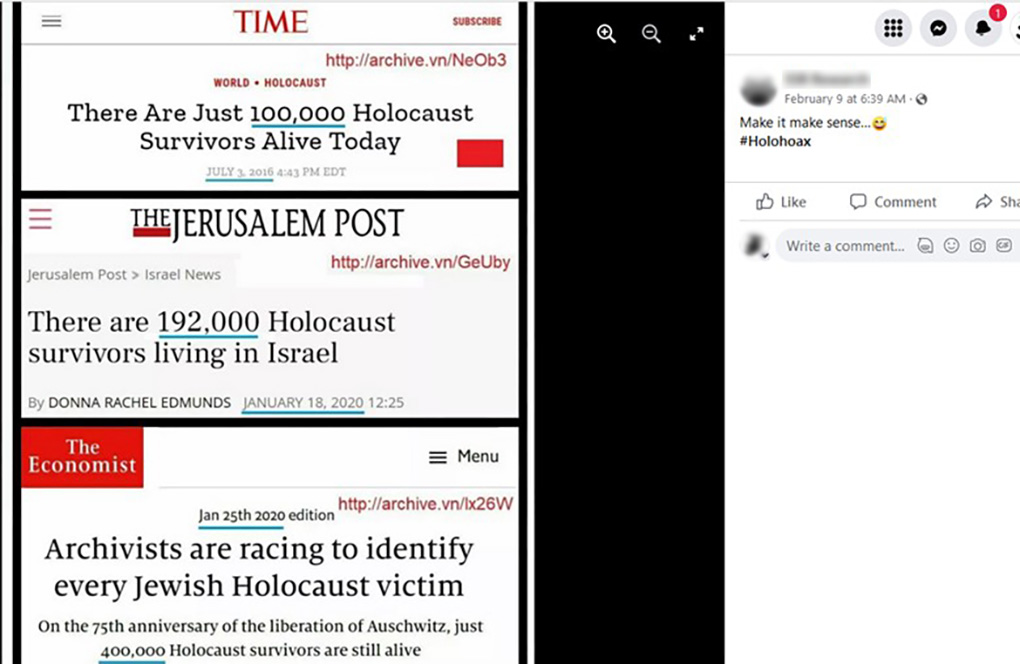
(Content removed after trusted flagger report)
YouTube
YouTube videos on Holocaust denial are a combination of inflammatory interviews by conspiracy theorists and documentary-style videos that purport to reveal the “truth” of the Holocaust.
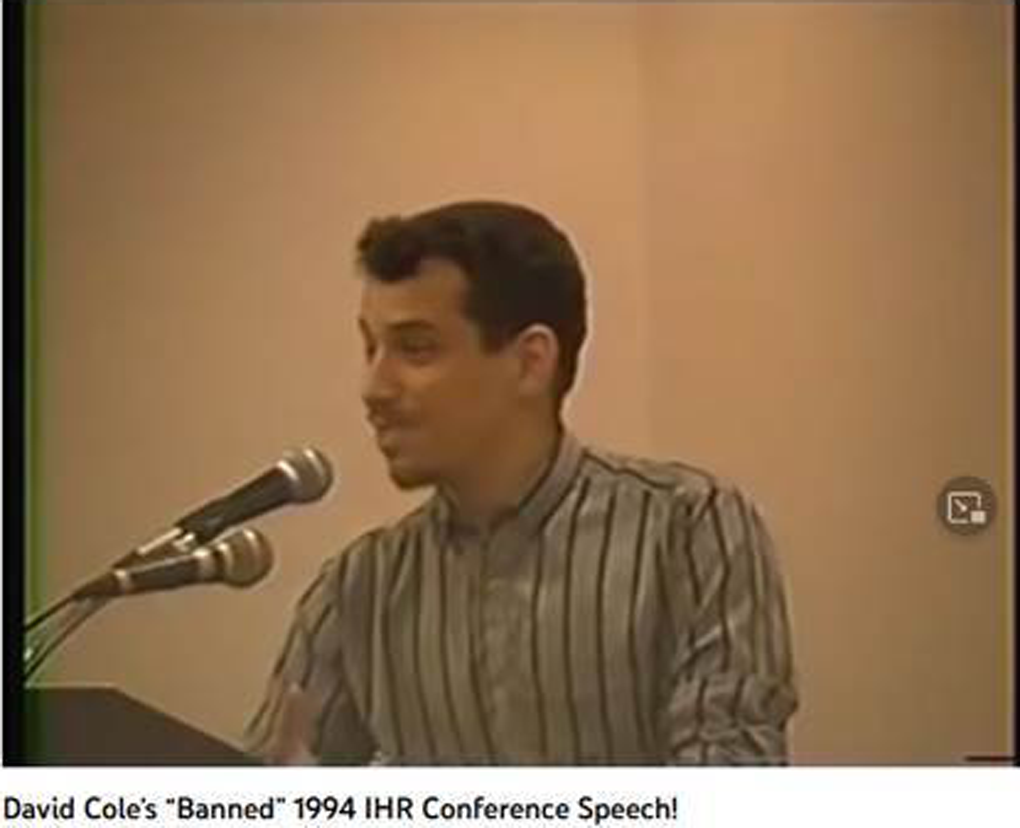
(Content removed after trusted flagger report)

(Content removed after trusted flagger report)
Discord
Holocaust denial content was discovered on multiple servers. The screenshots below are from conversations in the official Discord server for the World War II-themed video game Hearts of Iron.

(Content removed after trusted flagger report)

(Content removed after trusted flagger report)
Twitch
Holocaust denial content on Twitch can appear in video streams, the titles of recorded videos, and the text of video descriptions. Twitch videos might include streamers or their guests talking about Holocaust denial or inserting statements like “the holocaust is a lie” in an otherwise unrelated description. The example below shows a description of a gameplay video that includes “holocaust is a lie” alongside game-related keywords.
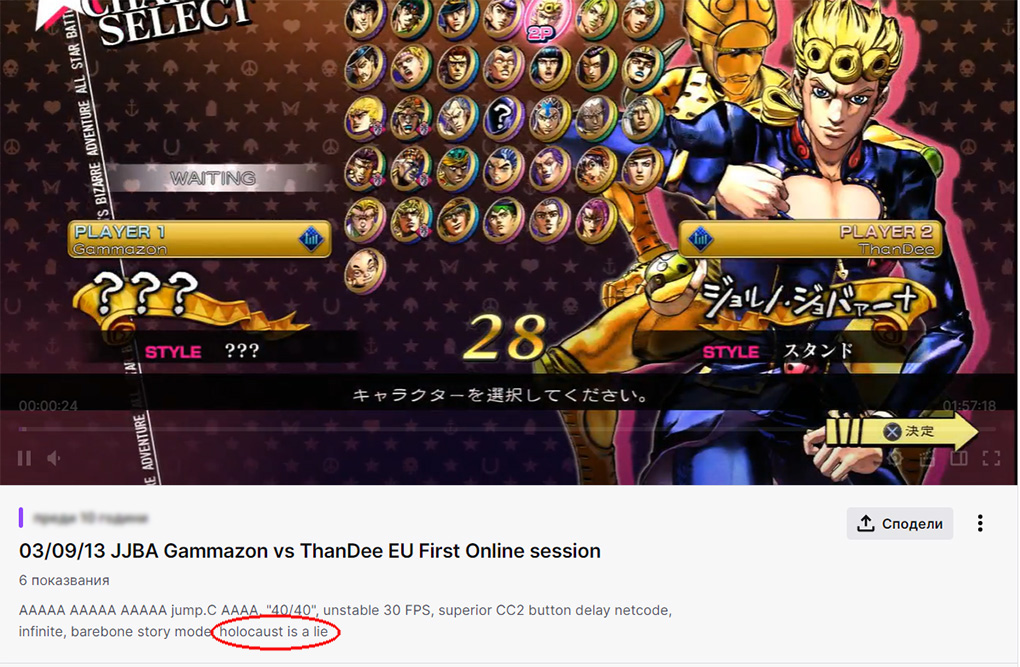
Fortnite (owned by Epic Games)
Using the website fortnitetracker.com, CTS was able to find several usernames associated with Holocaust denial. Multiple users had the name “Holohoax,” while others included the username “Holohoax” with the number 88, a white supremacist reference to “Heil Hitler.” Others used “6 Gorillion,” a hateful phrase used to mock Jews by claiming they exaggerate the number of people who died during the Holocaust.


League of Legends (owned by Riot Games)
We found several usernames associated with Holocaust denial through the website tracker.gg. As with Fortnite, multiple users had the name “Holohoax,” while another user who played frequently in competitive, ranked matches had the username “6gorillionlies.”

(Content removed after regular user report)
Call of Duty (owned by Activision Blizzard)
CTS found multiple usernames associated with Holocaust denial using the website cod.tracker.gg. As in the other two games we investigated, some users had the name “Holohoax,” while others had more explicit usernames such as “Holocaustnoreal” and “Holocaustisfake.”


Conclusion
Our investigation found that tech platforms recognize Holocaust denial and will act on it when the content is flagged by a trusted source but are less likely to action it when it is reported by an average user. In these cases, platforms shift the onus to track and flag content onto organizations such as ADL, when they should be proactively enforcing their policies or, at the very least, responding to users when they flag violative content.
Some platforms, like YouTube, provide detailed rationales for their decisions when the user is a trusted flagger, but most platforms are unlikely to grant the same courtesy to an ordinary user. The only platform to remove content and communicate its decision to an average user was Riot Games’ League of Legends. This is notable because Riot Games does not prohibit Holocaust denial, yet it determined the content violated its anti-hate policies. In our 2021 Holocaust denial report card, Twitter did not have an explicit Holocaust denial policy but took action against such content. Content moderation is twofold: Tech companies must have clear policies that moderation teams and users can easily understand, and they need to enforce them consistently.
Ignorance about the Holocaust correlates to increased antisemitic attitudes. ADL’s Center for Antisemitism Research (CAR) surveyed a nationally representative sample of over 4,000 Americans to better understand attitudes toward Jews and Israel. When respondents were asked how many Jews were murdered in the Holocaust, those who answered correctly believed the fewest anti-Jewish tropes: 3.2, on average. In contrast, those who thought fewer than a million Jews died in the Holocaust believed, on average, 7.3 tropes, while those who indicated they did not know the number believed, on average, 5.3 anti-Jewish tropes.
At a time when antisemitism is on the rise across the United States, tech platforms bear considerable responsibility for serving as megaphones for Holocaust deniers. Jewish users face real threats, but the response from platforms has been lackluster. ADL calls on tech companies to stop being complacent when confronted with anti-Jewish hatred.
Recommendations for Social Media and Game Platforms
As antisemitic incidents reach all-time reporting highs, tech companies have the power to curb Holocaust denial on their platforms and implement proactive approaches to preventing its proliferation.
Ban Holocaust denial.
With the proliferation of Holocaust denial and its demonstrable connection to offline antisemitic harm, a general hate policy is not enough to combat the genuine threat that Holocaust denial poses. Similarly, it is insufficient to classify Holocaust denial content as misinformation, which is often downranked but not removed. To ensure that Holocaust denial can be removed, platforms should recognize Holocaust denial as a form of hate and ban it. The policy should be clear to all users upon account creation and easily accessible on the platform’s interface.
Enforce policies against Holocaust denial quickly, consistently, and at scale.
The longer that Holocaust denial content remains in circulation on a platform, the more dangerous it becomes. Tech companies and social media platforms must ensure that they are able to quickly detect and remove Holocaust denial content through automation and well-trained human moderators. Enforcement should be consistent so that the policy applies to all users, regardless of influence or verification status.
Encourage reporting, and make it easy.
Platforms should make concise, user-friendly materials that educate users about Holocaust denial and show them how to report content that violates policies. Education on Holocaust denial and how to report it should take place upon account creation, but platforms can use push notifications and other mechanisms to remind users of their access to a reporting feature. Reporting features should be easy to find and use, and they should include a specific tag or drop-down item for Holocaust denial content to increase the efficacy of moderation efforts.
Commit to learning about how Holocaust denial exists on the platform.
To equip a moderation team to combat Holocaust denial, a tech company should be able to answer questions about what it looks like and who spreads it through which channels. Platforms should research the proliferation of Holocaust denial content and the most effective ways to eliminate it. Platforms should also extend data access to researchers who study Holocaust denial and mitigation efforts, which are invaluable to developments in online safety.
Consult experts for review of content moderation training materials.
Tech companies should seek the advice of subject-matter experts like ADL when drafting and revising the guidelines they use to train their human content moderators and automation systems on Holocaust denial content. Platforms should also use and review ADL’s resources, including our Glossary of Extremism, which address antisemitic attitudes that are often linked to Holocaust denial.
Improve transparency.
ADL supports improved platform transparency, especially around content moderation policies and decisions. Platforms should regularly release statements on the number of reports received, the number of actions they took based on reports, the number of posts they automatically flagged for violation, and the rationale behind human moderation decisions and any subsequent appeal processes. In cases where reported content is not removed, a platform should explain why the content did not violate its content policy, not only for Holocaust denial content but for all forms of hate.
Develop anti-hate products and features.
Tech companies should develop products that curb the spread of Holocaust denial and other violative content, prioritizing user safety over engagement. Some options include adjusting what kinds of content are discoverable in search, limiting the sharing or amplification of automatically flagged content, expediting the review process for reports of Holocaust denial, routing decisions on policy violations back to reporters, and creating a pop-up message for users before they post content that is likely to be violative. Most importantly, tech companies must think of their users and approach product development with a desire to keep them safe.
Work together to combat Holocaust denial online.
Social media platforms should collaborate with one another to minimize the spread of Holocaust denial content between platforms, spot emerging trends, and develop best practices. They can engage leaders in academia and civil society to develop robust strategies to combat online hate.
Recommendations for Public Policymakers
Holocaust education is critical for teaching students the dangers of bias and hate. Unfortunately, there are discrepancies across states regarding what schools and educational agencies carry out Holocaust education, what types of lessons and curricula are taught, and what resources and training are available to support educators. A thorough Holocaust education curriculum is necessary to ensure that future generations have the knowledge to combat hate and prejudice.
Congress should immediately pass the HEAL Act to study the Holocaust education efforts of states, local educational agencies, and public elementary and secondary schools. To improve and support Holocaust and antisemitism education, we must first understand what programs, curricula, and resources exist.
Additional Policy Recommendations
ADL’s 2022 Audit of Antisemitic Incidents recorded 3,697 incidents across the United States in 2022—an average of 10 incidents per day, a 36 percent increase from the year before. This is the highest level of antisemitic activity since ADL started tracking these incidents more than 40 years ago. While there is no single fix to this alarming trend, ADL’s COMBAT Plan offers a comprehensive six-part framework for elected officials and policymakers to take meaningful action to fight antisemitism. ADL urges leaders to:
Condemn Antisemitism
Public officials and civic leaders—the President, governors, attorneys general, mayors, other civic leaders, and law enforcement authorities—must use their power to speak out against antisemitism, hate, and extremism. Regardless of its origins—from the far left to the far right and anywhere in between—leaders must call out antisemitism, including anti-Zionist antisemitism, and rally their communities to action.
- Condemn all forms of antisemitism, and respond to antisemitic incidents, in timely, specific, and direct ways.
- Challenge antisemitism in the United States via a whole-of-government strategy.
- Incorporate antisemitism education and training in government as part of Diversity, Equity, Inclusion, and Accessibility (DEIA) efforts and other anti-bias initiatives.
- Urge federal, state, and local elected officials to sign ADL’s Pledge Against Antisemitism.
- Adopt the International Holocaust Remembrance Alliance (IHRA) Working Definition of Antisemitism as a legally nonbinding education tool.
Oppose Hate and Extremism Driven by Antisemitism
Fighting hate crime is critical, especially now that antisemitism and other forms of hate, racism, and bigotry are at an all-time high. It is particularly alarming that the Federal Bureau of Investigation (FBI) hate crime statistics for 2021 convey the lowest participation from cities and states in two decades. Policymakers must resolve the alarming gaps in data collection and reporting to combat hate-motivated violence.
- Support hate crime laws and improve hate crime data collection and reporting.
- Support full funding of the Jabara-Heyer NO HATE Act.
- Adopt wide-ranging measures to combat all forms of domestic antisemitic extremism, most notably the array of policy recommendations outlined in ADL’s PROTECT plan.
Make Institutions Safe from Antisemitism
For the past decade, federal, state, and local government funding has provided crucial support for bolstering the security of our nation’s nonprofits, including religious institutions, as a response to continued targeting by violent extremists. The Jewish community must be protected from these threats and counter the movements that produce them.
- Protect the physical security of Jewish community institutions through full funding of the Nonprofit Security Grant Program.
- Request that synagogues across the country join ADL’s Kulanu: Synagogues in Action Against Antisemitism program.
- Safeguard Jewish students in postsecondary institutions.
- Fully enact Executive Order (EO) 13899 on Combating Anti-Semitism, enforcing Title VI of the Civil Rights Act of 1964 against prohibited discrimination rooted in antisemitism.
- Urge federal and state Departments of Education and postsecondary institutions to enforce existing antidiscrimination policies and ensure that appropriate disciplinary measures are used against individuals and institutions when appropriate.
Block Antisemitism Online
Federal and state governments have an important role in reducing online hate, harassment, and extremism fueled by antisemitism.
- Adopt ADL’s comprehensive approach to combating online hate, harassment, and extremism, including antisemitism, as delineated in the REPAIR plan.
- Support online literacy programs, in collaboration with the private sector, to help educate the general public about how to identify hate speech to avoid unintentional indoctrination.
Act Against Global Antisemitism
Global antisemitism is on the rise, and fighting it is an American interest. We cannot win this fight unless America plays a leading role by encouraging other countries to do more.
- Strengthen the Offices of the U.S. Special Envoy to Monitor and Combat Antisemitism and the U.S. Special Envoy for Holocaust Issues.
- Amplify intergovernmental cooperation between the U.S. and foreign governments to fight global antisemitism and specific regional manifestations.
- Support furthering the Abraham Accords to usher in a new era of bridge-building between Israel and its neighbors and provide opportunities to promote tolerance and fight antisemitism in the region.
- Counter state-sponsored antisemitism and related terrorism.
- Mobilize against the Boycott, Divestment, and Sanctions (BDS) campaign and other efforts to demonize, delegitimize, and isolate Israel in international forums.
Teach About Antisemitism
Eliminating antisemitism and other forms of bigotry requires government and civil society leaders to promote anti-hate, anti-bias, and civics education programs. Holocaust education provides a context in which to learn about the danger of what can happen when hate goes unchallenged.
- Promote understanding of Jewish people today.
- Include antisemitism in anti-bias education and related training.
- Support ADL’s #LearnToNeverForget campaign.
- Study Holocaust education efforts nationwide and resource Holocaust education, including through the Never Again Education Act.
- Encourage state governments to institute age-appropriate Holocaust and antisemitism education as part of their curricula and provide the means for school districts and educational institutions to deliver such education.
- Advance global efforts to support Holocaust and antisemitism education and a curriculum that fights violence, bigotry, and hate, particularly within the Middle East.












